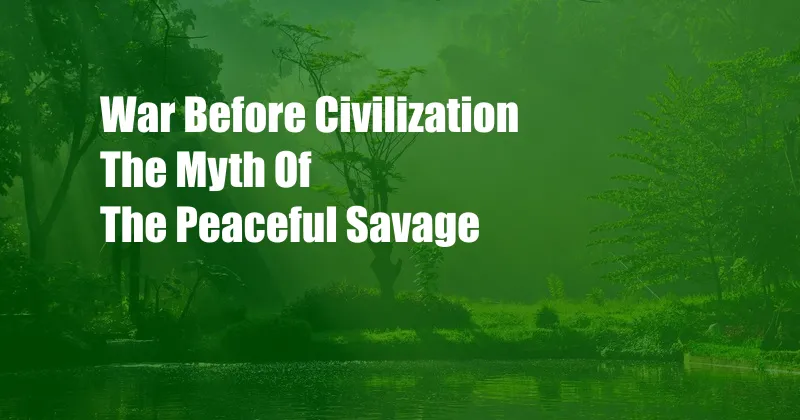
War Before Civilization: The Myth of the Peaceful Savage
As children, many of us are taught that humans lived in a state of peaceful coexistence before the advent of civilization. This idea, known as the “noble savage” myth, has been perpetuated through popular culture, literature, and even some academic circles. However, a closer examination of history and anthropology reveals that this myth is far from the truth. In fact, war has been an integral part of human society for millennia, dating back to the very origins of our species.
The notion of the peaceful savage is largely based on the writings of 18th-century philosophers such as Jean-Jacques Rousseau. Rousseau believed that humans were inherently good and that civilization had corrupted them. This view was later embraced by Romantic poets and writers, who idealized the simplicity and harmony of primitive societies.
The Evidence of Warfare
However, archaeological and anthropological evidence paints a very different picture. Studies of ancient human remains and settlements have uncovered a wealth of evidence for warfare, including:
- Skeletal injuries consistent with combat
- Fortifications and defensive structures
- Weapons and tools designed for warfare
The evidence suggests that war has been a common feature of human societies for at least 10,000 years, with some evidence suggesting its existence even earlier. Warfare was not limited to isolated incidents but was an organized and often brutal affair. Archaeological evidence indicates that entire villages and settlements were destroyed during raids and conflicts.
Causes of Warfare
The causes of warfare in prehistoric societies are complex and varied. Some common factors include:
- Competition for resources such as land, water, and food
- Territorial disputes
- Revenge and retribution
- Cultural and ideological differences
It is important to note that warfare was not necessarily a constant state of affairs. Periods of peace and cooperation could exist between different groups. However, the threat of violence was always present, and conflicts could erupt quickly and without warning.
The Impact of Warfare
Warfare had a profound impact on the development of human societies. It led to the development of new technologies and strategies for conflict, as well as the rise of social hierarchies and political leaders. War also shaped cultural practices, such as rituals and beliefs related to combat and bravery.
In some cases, warfare could also contribute to technological and social progress. The need for efficient weapons and fortifications led to advancements in metallurgy and engineering. War also spurred the development of new political structures and alliances.
Experts’ Perspective
Anthropologist Margaret Mead has argued that war is a learned behavior, not an inherent human trait. She believed that peaceful societies could exist if children were raised in an environment free from violence and aggression.
Historian Steven Pinker has also studied the history of violence and war. He has found that while war has been a persistent feature of human society, its frequency and severity have declined over time. Pinker attributes this decline to the rise of civilization, the spread of education, and the development of international institutions.
Tips to Understand the Topic
To better understand the topic of war before civilization, consider the following tips:
- Read books and articles by scholars in the fields of anthropology, history, and political science.
- Visit museums and historical sites that feature exhibits on warfare and ancient societies.
- Attend lectures and seminars on the topic.
By exploring these resources, you can gain a deeper understanding of the complex relationship between war and civilization.
FAQ
Q: Did humans really live in a state of peace before civilization?
A: No. Historical and archaeological evidence indicates that warfare has been a part of human society for millennia.
Q: What were some of the causes of warfare in prehistoric societies?
A: Competition for resources, territorial disputes, revenge, and cultural differences were common causes of warfare.
Q: How did warfare impact the development of human societies?
A: Warfare led to the development of new technologies, social hierarchies, and cultural practices. It also contributed to technological and social progress in some cases.
Conclusion
The myth of the peaceful savage is a romantic ideal that has little basis in historical reality. War has been an integral part of human society for millennia, shaping its development and leaving a profound impact on our cultures and beliefs. By understanding the causes, consequences, and historical context of warfare, we can better appreciate the complexities of human behavior and strive to create a more peaceful future.
Are you interested in learning more about war before civilization and its impact on human societies?